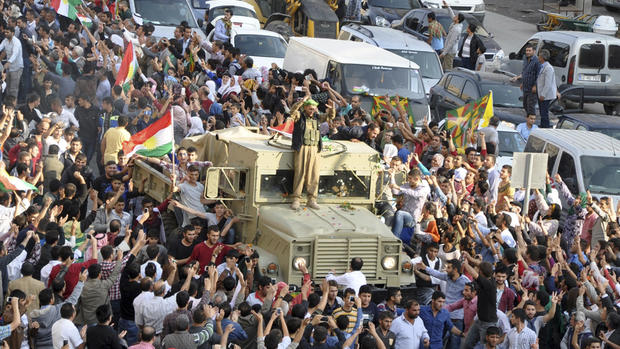U.S. conducts 14 more airstrikes against ISIS in Iraq and Syria
The U.S. military carried out 14 more airstrikes against extremists in Iraq and Syria, according to a statement from U.S. Central Command obtained by Reuters.
U.S. forces in Syria made eight strikes near the key Syrian border town of Kobani near Turkey, destroying a small Islamic State of Iraq and Syria (ISIS, also known as ISIL) unit of fighters, a "command and control node" and other buildings, vehicles and fighting positions for the militant group, Centcom said on Wednesday.
In Iraq, U.S. forces conducted six air strikes, three near Fallujah and three near Sinjar, destroying several small ISIS units and two vehicles, the statement said, according to Reuters.
The announcement of the Iraq strikes came just before Baghdad officials said ISIS militants lined up 30 Sunni men in a town west of Baghdad and shot them dead.
The slayings took place on a main street in the town of Hit on Wednesday.
Anbar provincial council chairman, Sabah Karhout, said the Sunnis killed were tribal fighters allied with the government and members of the security forces captured when ISIS overran the town, located about 85 miles west of the Iraqi capital.
Hit fell to ISIS in early October after fierce clashes with government forces backed by the Sunni fighters from the Albu Nimir tribe.
ISIS militants have seized large swaths of land in western and northern Iraq in the country's worst crisis since the 2011 U.S. troop withdrawal.
In Syria, a small group of Syrian rebels on Wednesday entered the embattled town of Kobani from Turkey for the first time since ISIS launched an offensive on the embattled border town.
The group of around 50 armed men is from the Free Syrian Army, and it's separate from Iraqi Kurdish peshmerga fighters who were also en route Wednesday to Kobani, along the Syrian-Turkish border.
Idriss Nassan, a Kurdish official from Kobani, said the FSA group entered Kobani through the Mursitpinar border crossing in Turkey. Nassan, who spoke from the border region in Turkey, said they travelled in cars but did not have more details.
The FSA is an umbrella group of mainstream rebels fighting to topple Syrian President Bashar Assad. The political leadership of the Western-backed FSA is based in Turkey, where fighters often seek respite from the fighting.
The 150 Iraqi peshmerga troops, along with cannons and heavy machineguns, arrived in Turkey from Iraq early on Wednesday and were expected to cross into Syria later in the day. Their deployment came after Ankara agreed to allow the peshmerga troops to cross into Syria via Turkey.
Kurdish fighters in Syria, known as the People's Protection Units or YPG, have been struggling to defend Kobani - also known as Ayn Arab - against ISIS since mid-September, despite dozens of coalition airstrikes against the extremists.
It is not clear what impact this small but battle-hardened combined force of FSA and peshmerga fighters - and their combined weaponry and added arsenal - will have in the battle for Kobani. Kurdish fighters are already sharing information with the coalition to coordinate strikes against ISIS militants there but the new force may help improve efforts and offer additional battlefield support.
Turkish Prime Minister Ahmet Davutoglu told the BBC that sending the peshmerga and the Free Syrian Army was "the only way to help Kobani, since other countries don't want to use ground troops."
A Kurdish journalist in Kobani and the Britain-based Syrian Observatory for Human Rights confirmed that a group of about 50 FSA fighters entered Kobani Wednesday.
After a rousing send-off from thousands of cheering, flag-waving supporters in the Iraqi Kurdish capital of Irbil, the peshmerga forces landed early Wednesday at the Sanliurfa airport in southeastern Turkey. They left the airport in buses escorted by Turkish security forces and were expected to travel to Kobani also through Mursitpinar crossing.
Nassan said the peshmerga force should be in Kobani "within hours." He said he was confident that the troops, although symbolic in number, would help change the balance of power in Kobani because of their advanced weapons.
ISIS launched its offensive on Kobani and nearby Syrian villages in mid-September, killing more than 800 people, according to activists. The Sunni extremists captured dozens of Kurdish villages around Kobani and control parts of the town. More than 200,000 people have fled across the border into Turkey.
